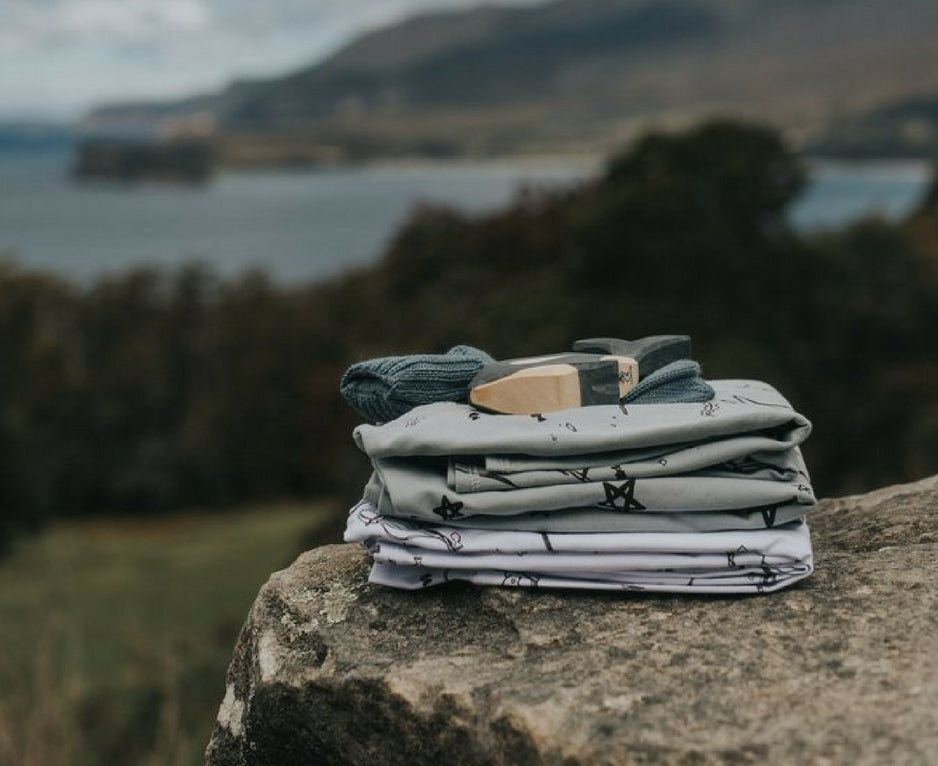
Why are ethical, organic baby & kids clothes more expensive?
Every now and again I get customers in my local shop that roll their eyes, turn around and whisper in their friend's ear "I am not spending $25 on an organic baby onesie when I can buy them at ……. for $5".
I understand their frustration, for most young families the daily costs of living are quite high. Everyone is watching their weekly budgets, trying to live a more conscious, ethical lifestyle all whilst having a big family to raise and feed.
For most of us (including myself) it feels great to grab a bargain! Buying new season kids clothes in Australia can be difficult when you're competing with growth spurts and that's why we often seek out the sales.
But let’s leave aside the excitement of the Bargain Hunting and focus on the TRUE COSTS of organic boys & girls clothes.
With everything I've learnt about the clothing industry, there is still one fact that has always shocked me the most...
The number of hands involved with making a cute baby boy or girl's outfit before it finally ends up in the shopping bag of a happy customer.
How is it possible for big companies to sell kids clothes, not only in Australia but worldwide, for just a few dollars?
Fair Wages
When a shop is selling a cute baby boy or girl’s outfit for $5, the brand behind it is working within extremely tight margins.
Considering their unit price, a brand needs to factor in fabrics, manufacturing, shipping, taxes and their own profit margin (not to mention all the other costs which aren’t directly related to a garment such as marketing, etc).
So, when all these costs are added up and your final retail price is $5, wages start to drop in the priority list.
In other words selling a unisex baby outfit for $5 and maintaining a fair wage for your factory workers, is very difficult to achieve.
In places like Dhaka, Bangladesh women are being paid less than 40 cents per hour.
The unfair treatment of workers has allowed kids clothes to be sold by big brands for $3, sometimes lower!
Value for All
Can we ensure that the shoes, clothes and food we buy are contributing to the fair treatment of people involved in the production of these goods? We sure can!
Receiving a wage means workers are able to cover the costs of basics such as food, water, education, health needs and shelter. Of each clothing item sold in Australia, approximately 4% of the price goes toward garment factory workers’ wages, according to Oxfam Australia’s latest report on the clothing industry.
Oxfam’s ‘A Sewing Kit for Living Wage’ states that IF big brands wanted to ensure the workers creating their clothing received living wages; and absorbed this cost within their supply chains; it would cost LESS than 1% (yep, ONE PERCENT) of the price of each item.
The 40 million workers in the Asia-Pacific region employed in the clothing and textiles industry who make the majority of the world’s clothes, shoes and linen are not being paid a decent wage, nor are they treated fairly. In countries such as Bangladesh, Cambodia, China, India, Myanmar, Pakistan and Vietnam, cases of child and/or forced labour are common, according to this year’s Ethical Fashion Report.
What can we do?
Of late, I keep getting more and more mums in my local shop who proudly let me know, that they are starting to buy ethically sourced clothing and slowly turning their family's wardrobes into a conscious clothing 'treasure chest'.
And for most of these mums, it doesn’t mean they will replace the equal amount of outgrown ‘fast’ Australian kids fashion with new ‘slow’ fashion clothes.
It means one garment at a time and a more sustainable household budget.
As for myself, I am constantly learning and growing with my business as I strive to make a conscious decision to provide magical organic baby & kids clothes. Clothes that will be loved for generations and feel good, for everyone who was or is connected to these clothes.
Elves in the Wardrobe is steadily growing alongside my passion for ethical organic baby and kids clothes. It makes me happy to work closely with so many wonderful ethically sourced kids fashion labels like, loud+proud, leela cotton, pigeon organics, poudre organic and buck&baa who are all committed to creating beautiful, comfortable, healthy organic kids clothes that will not only last but also help to make a change for everyone involved.
Yes, ethical organic fashion costs more but each extra dollar represents an investment in the fair treatment of people, in the protection of our planet and in nurturing our hand made traditional craft.
These higher prices aren’t there to create status or generate more revenue for shop owners but to simply cover a living wage for those involved in production and support environmentally responsible practices.
So surely they’re not high prices, just reasonable prices.
Don’t you think?


